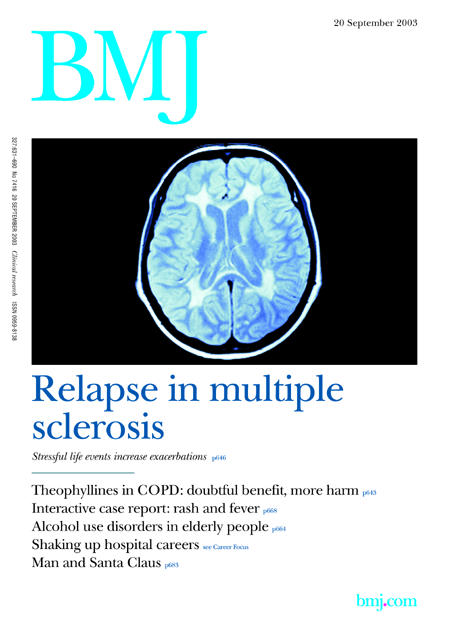Editor—The front page of the BMJ of 20 September 2003 carries the title: “Relapse in multiple sclerosis: stressful life events increase exacerbations.” Buljevac et al present evidence that psychological stress is associated with a doubling in risk of relapse.1 Two issues arise.
Firstly, this study has limitations, some of which are clearly acknowledged by the authors. The most critical limitation of the study is recall bias. Patients having a relapse are more likely to seek an explanation and hence report stressful events during preceding weeks. In other diseases such as myocardial infarction, patients commonly attribute their illnesses to psychological factors.2
Secondly, association does not equate to causality. An alternative hypothesis is that “psychological stress” and neurological relapse are different temporally disseminated manifestations of the same underlying disease process. Magnetisation transfer changes precede the traditional radiological signs accompanying clinically overt neurological relapse by up to three months.3 Subclinical reversible cognitive changes accompany relapses.4
Figure 1.

Thus an appreciable number of negative life events could have occurred, or be perceived to have occurred, as a result of subtle changes in cognition or behaviour preceding an overt clinical relapse. Several groups have reported the presence of an association between relapse and mild to moderate stressful life events (which might occur secondary to changes in daily life management). This association disappears with major negative life events (which are beyond control).5 Since disease burden was not controlled for, we do not know whether stressful life events predicted relapse independently of what may have also elicited such events.
The study's impact on the understanding of relapse pathogenesis needs to be assessed with caution.
Competing interests: None declared.
References
- 1.Buljevac D, Hop WC, Reedeker W, Janssens AC, van der Meche FG, van Doorn PA, et al. Self reported stressful life events and exacerbations in multiple sclerosis: prospective study. BMJ 2003;327: 646. (20 September.) [DOI] [PMC free article] [PubMed] [Google Scholar]
- 2.Billing E, Bar-On D, Rehnqvist N. Causal attribution by patients, their spouses and the physicians in relation to patient outcome after a first myocardial infarction: subjective and objective outcome. Cardiology 1997;88: 367-72. [DOI] [PubMed] [Google Scholar]
- 3.Filippi M, Rocca MA, Martino G, Horsfield MA, Comi G. Magnetization transfer changes in the normal appearing white matter precede the appearance of enhancing lesions in patients with multiple sclerosis. Ann Neurol 1998;43: 809-14. [DOI] [PubMed] [Google Scholar]
- 4.Foong J, Rozewicz L, Quaghebeur G, Thompson AJ, Miller DH, Ron MA. Neuropsychological deficits in multiple sclerosis after acute relapse. J Neurol Neurosurg Psychiatry 1998;64: 529-32. [DOI] [PMC free article] [PubMed] [Google Scholar]
- 5.Mohr DC, Goodkin DE, Bacchetti P, Boudewyn AC, Huang L, Marrietta P, et al. Psychological stress and the subsequent appearance of new brain MRI lesions in MS. Neurology 2000;55: 55-61. [DOI] [PubMed] [Google Scholar]


